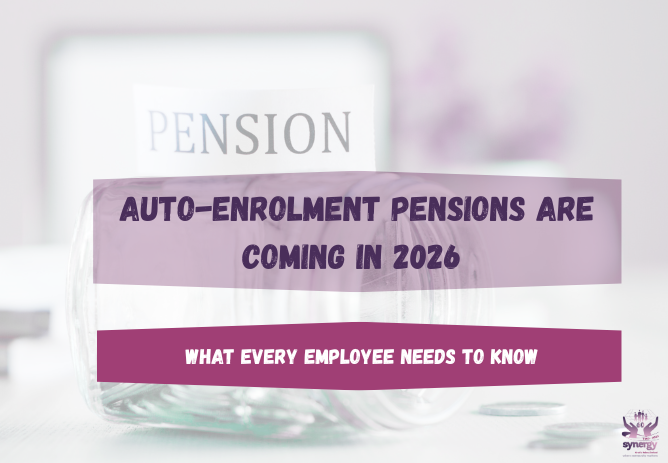10 November 2025
Auto-Enrollment Pensions
What Every Employee Needs to Know Before 2026
From January 2026, Ireland will introduce a new Automatic Enrollment Retirement Savings System — the biggest change to pensions in decades.
If you’re aged between 23 and 60, earn €20,000 a year or more, and don’t already have a workplace pension, you’ll be automatically enrolled in this new scheme. The goal is simple: to make sure every worker in Ireland builds up retirement savings, rather than relying only on the State Pension.
Why Auto-Enrolment Matters
Ireland is one of the few developed countries without a nationwide auto-enrollment pension system — until now. Too many people reach retirement with only the State Pension, which currently pays around €280 per week.
The new scheme is designed to help you save automatically for a better standard of living when you retire — and your employer and the State will help you do it.
How It Works
If you qualify, you’ll be automatically signed up and your contributions will come straight from your wages, just like tax or PRSI.
Your employer will match your contribution, and the State will also add a top-up. You don’t need to fill out any forms or apply — it all happens through payroll.
Here’s the official contribution schedule announced by the Department of Social Protection:
Years in Scheme | You Pay | Your Employer Pays | The State Adds |
Years 1 – 3 | 1.5% of your gross pay | 1.5% | 0.5% |
Years 4 – 6 | 3% | 3% | 1% |
Years 7 – 9 | 4.5% | 4.5% | 1.5% |
Year 10 onward | 6% | 6% | 2% |
That means for every €3 you save, your employer and the State will bring it up to €7 in total.
You’ll be saving for your own personal retirement pot, and if you move jobs, your pension will move with you — it’s a “pot-follows-member” system.
The Power of Compound Interest
This is where pensions really shine.
Every euro you save in your pension doesn’t just sit there — it’s invested to grow over time. That growth then earns interest on the interest, year after year. This snowball effect is called compound interest, and it’s what makes long-term saving so powerful.
For example:
If you saved just €100 a month from age 25, earning an average annual return of 5%, you’d have around €76,000 by age 65. But if you waited until 35 to start, you’d only have about €41,000.
The earlier you start, the harder your money works — because time is your greatest ally when it comes to building a pension.
What If You Don’t Want to Join?
You can opt out after six months if you really wish — but most people who do later re-join once they see what they’re missing out on.
Even a small contribution can make a big difference, especially when it’s matched by your employer and topped up by the State.
And remember, this pension is on top of your State Pension — not instead of it.
How This Will Affect Your Pay
Your contribution will come from your gross pay before tax, so you’ll notice a small deduction, but you’ll be gaining the matching employer contribution and State top-up.
It’s like getting free money for your future — money that grows year after year.
What You Should Do Now
- Check if you already have a workplace pension through your employer. If you do, you may not be automatically enrolled.
- Review your payslip to understand your gross earnings and whether you’ll meet the €20,000 threshold.
- Start budgeting for your contribution — it’s small at the start (1.5%) but will rise over time.
- Stay in the scheme if you can. Opting out means losing your employer and State contributions.
Frequently Asked Questions (Q & A)
Employees aged 23 – 60, earning €20,000 or more per year, and not already in a workplace pension.
Yes. You can opt out after six months, but you’ll miss out on employer and State contributions. You’ll be automatically re-enrolled every two years if you’re still eligible.
No. The State Pension continues separately. Auto-enrollment is an extra savings pot to give you more income when you retire.
Your pension pot will follow you — it’s portable, so you keep building on the same savings.
Your contributions are invested in approved funds. Over time, compound interest helps your pension grow faster as returns generate more returns.
Self-employed people won’t be automatically enrolled at first, but the Government plans to expand eligibility later. You can still set up a Personal Retirement Savings Account (PRSA) now.
It will be run by the National Automatic Enrolment Retirement Savings Authority (NAERSA), which will oversee contributions, investment, and member accounts.
In Summary
Auto-enrollment is designed to make saving for retirement effortless — helping workers build long-term financial security with help from employers and the State.
At Synergy Credit Union, we believe in the same principle: that small, consistent savings today create big security tomorrow. Whether it’s your credit union savings or your pension contributions, the earlier you start, the more powerful the results.
If you’d like help planning your finances around auto-enrollment or understanding how to balance pension savings with other goals, drop into your local Synergy Credit Union branch — we’re here to help.
Disclaimer
This article is for general information purposes only and is not intended to provide financial or pension advice.
While every effort has been made to ensure accuracy based on information from gov.ie and the Automatic Enrollment Retirement Savings System Act 2024, details may change before implementation.
Readers should not rely solely on this content when making pension or financial decisions. For personalised guidance, please consult a qualified financial adviser or a pension professional.








